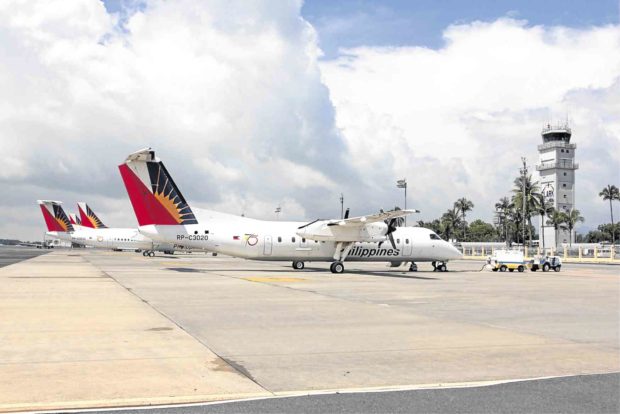
Passenger jets parked at Clark International Airport, which had been built by US forces to accommodate fighter jets and heavy-duty planes —PHOTO COURTESY OF CIAC
CLARK FREEPORT — Due to an improved cash flow from additional flights encouraged by President Rodrigo Duterte, the state-owned Clark International Airport Corp. (CIAC) is remitting dividends to the national treasury after three years.
CIAC is remitting P38.2 million, which is half of the agency’s 50-percent annual net earnings of P76.4 million, CIAC president and chief executive officer Alexander Cauguiran said.
“CIAC’s well-crafted plan plus a results-oriented leadership amounted to millions of pesos in remittances,” Cauguiran said in a statement.
“President Duterte’s resolve and call to shift [airline] operations from Manila to Clark has borne fruit as we will now be able to remit the dividends pertaining to the years 2014 and 2015,” he said.
CIAC’s net income totaled P46 million in 2014, P30 million in 2015 and P77 million in 2016—or a total of P152 million.
Each week, the Clark International Airport serves 134 international flights and 104 domestic flights, expecting passengers to grow to 1.5 million by the end of 2017, Cauguiran said.
Cauguiran also announced that China Eastern Airlines, said to be China’s second largest carrier by passenger numbers, would start its Clark-Shanghai flights on Oct. 18. JetStar’s Clark-Singapore flights would start on Nov. 18.
Philippine Airlines, he said, would add Tagbilaran, Bacolod and Cagayan de Oro among its flights to and from Clark.
Calls have been made for the government to make the airport in Clark, a former major air base of American forces, the premier port of entry to replace the aging Ninoy Aquino International Airport which has been suffering from a host of problems, including air traffic congestion.
The proposals, however, had all but been ignored.
Other business groups had offered to build airports outside Metro Manila as a means to ease the flow of road traffic within the metropolis.
But the Department of Transportation (DOTr) had shown a determination to convert Clark into the next hub of business and commerce outside Metro Manila by transferring its offices to Clark amid complaints by department employees currently used to reporting for work at the DOTr’s main office in Mandaluyong City. —Tonette Orejas